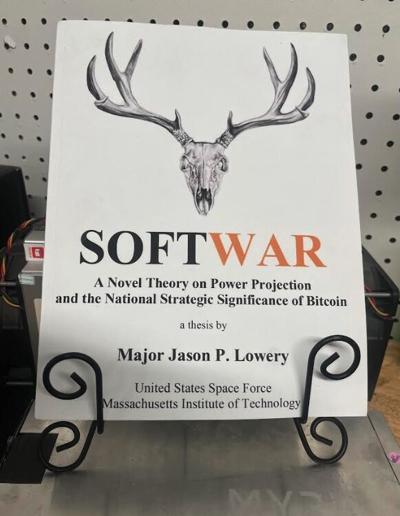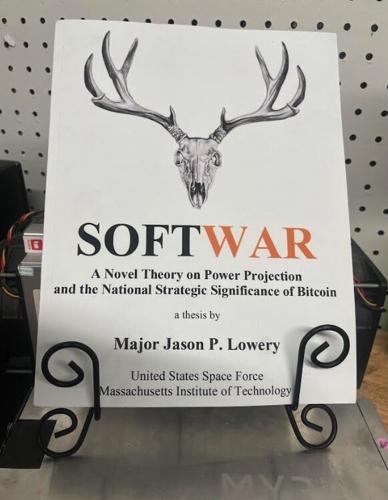Tick-tock, next block.
As we've covered previously in this column (Oct. 27), President-elect Donald Trump has undergone an 180-degree “about face” of both his understanding and executive policy regarding bitcoin.
Turns out, so has Russian President Vladimir Putin.
Putin’s love-hate relationship with the digital asset goes back to at least 2019 when his political opponent Alexei Navalny raised “more than 591 BTC in donations over the last three years, worth about $3 million (then)," according to industry publication Coindesk. A 2021 headline of The Moscow Times (TMT) read “Russian Opposition Finds Refuge in Bitcoin.”
One of Navalny’s top aides, Leonid Volkov described for TMT that the team found bitcoin and other cryptocurrencies to be “... a useful tool for circumventing the Russian authorities, who have increased their crackdown on Navalny and his supporters, including their funds.”
By “crackdown … (on) their funds,” Reuters reported in 2021 that “Russia has moved to ban Navalny's Anti-Corruption Foundation and regional groups as ‘extremist,’ dealing a blow to the network built up by President Vladimir Putin's most outspoken opponent. It is illegal to donate to ‘extremist' groups.”
This caused Navalny to move toward accepting cryptocurrency donations, which function outside of any nations’ banking systems, and cannot be controlled, frozen or seized by governments or banks.
Trump learned this, reportedly in May 2018, directing his then Treasury Secretary Steve Mnuchin to “go after bitcoin,” in an early attempt at a clampdown on bitcoin, which went nowhere. Putin has unironically learned his lesson as well, saying
“Who can ban bitcoin? Nobody …”
… earlier this month at the Moscow Economic Forum, having enacted legislation to launch bitcoin mining in Russia for the express purpose of working around U.S. sanctions, just as other Russian politicians previously used bitcoin to work around his sanctions.
Their upcoming government-owned mining efforts notwithstanding, TMT reported in 2023 that private industries had already made Russia the second-largest cryptocurrency mining nation in the world, bumping Kazakhstan to third, with the U.S. remaining first.
Previously, Russia allowed digital asset ownership for investment purposes, but did not permit them for payments. However, spending bitcoin is now legal in Russia, like in the U.S. and most regions. Reuters quoted Finance Minister Anton Siluanov on Wednesday saying that the legislative changes were “... in order to counter Western sanctions. …
“Earlier this month," the article continued, "President Vladimir Putin said that the current U.S. administration was undermining the role of the U.S dollar as the reserve currency by using it for political purposes, forcing many countries to turn to alternative assets.”
All just BRICS in the wall
“Many countries,” it said. Putin is not alone in the search for alternative currencies, bitcoin among them, and has played the key role in forming a loose affiliation of nations experiencing similar pain points. According to the Council on Foreign Relations’ website, Putin first called a few select countries — Brazil, Russia, India and China (later adding South Africa, changing from BRIC to BRICS) to a summit in 2009. Today, the number has grown to currently about nine countries officially, plus over 20 other nations are elsewhere reported to have applied for membership.
Why?
In order “to work more closely among themselves to reduce reliance on the U.S. dollar,” the website says, continuing
“The BRICS group has become a major political force in the last two decades, building on its desire to create a counterweight to Western influence in global institutions,” and “Russia’s 2024 leadership could intensify the bloc’s anti-West focus, including attempts to edge out the U.S. dollar …”
According to The Associated Press last month, “At a summit of BRIC nations in October, Russian President Vladimir Putin accused the U.S. of ‘weaponizing’ the dollar and described (doing so) as a ‘big mistake.’
‘It’s not us who refuse to use the dollar,’ Putin said at the time. ‘But if they don’t let us work, what can we do? We are forced to search for alternatives.’
“Russia has specifically pushed for the creation of a new payment system that would offer an alternative to the global bank messaging network, SWIFT, and allow Moscow to dodge Western sanctions and trade with partners,” the AP article stated.
Discussions about “using gold as the basis for international exchange, a role previously taken by dollars and euros” (Forbes, January 2024) has been considered by BRICS, and more recently in November TMT confirmed that Russia will be partnering with BRICS countries to mine bitcoin, not just purchase it, and that already “Argentina, Ethiopia and the United Arab Emirates — are leveraging state-owned resources to mine Bitcoin.”
These reports come immediately on the heels of Trump’s reelection and his now well-known “campaign promise” of purchasing a stockpile of up to 1 million bitcoin, to be held by the Treasury as America’s strategic reserve, along with our gold and oil. With Trump campaigning on the 1-million-bitcoin-reserve goal, sitting Senator Cynthia Lummis (R-WY) had made strides introducing and now reintroducing her bitcoin act (S.4912 - BITCOIN Act of 2024 118th Congress), which “advocates for creating a U.S. strategic bitcoin reserve aimed at strengthening the national economy and addressing the growing national debt.”
It's called game theory. We don't make the rules
Interestingly, Trump’s campaign promise to stockpile bitcoin has put many other nations on high alert. Without giving away the college course, game theory simply means that while you might not want to be the first country that adopts gun powder, you can’t afford to be the last one to do so, or you won’t be a country much longer.
And once such a game is in play, players have to begin making decisions (and expenditures, in this case, and laws …) based not so much on their own desires, but based on guessing what the other players are going to do, and what will happen to them if they don’t. The nuclear arms race is another example: Nobody really wants 10,000 nuclear weapons OK? At least, not until their enemy has 5,000.
Merchants don’t really care for the hassles of accepting credit cards either, but many do because all of their competitors do and they’d lose sales by not. And now a currency with the power to obliterate nation-states that don’t adopt it exists, and yet it does so peacefully, with no bullets fired.
Yahoo! Finance reported in July on Trump’s bitcoin-related campaign remarks, writing that he “warned that the United States must embrace digital currencies to prevent China from dominating the field.” On stage at the Bitcoin Conference held in Nashville, Trump specifically said his plan would ensure (among other things) that the United States would “become the bitcoin superpower of the world. And we’ll get it done."
Now that he has won the election, and it looks like that he will continue to pursue this promise, other nation-states have reacted by deciding it's time “… to get some, in case it catches on.” — Satoshi Nakamoto
To wit:
Bloomberg: "Bitcoin’s Geopolitical Power Play"
The Financial Times: "The geopolitics of cryptocurrency: Bitcoin and the new cold war"
The Wall Street Journal: "Bitcoin, Blockchain and Geopolitics: The New Global Chessboard"
Reuters: "Bitcoin's role in international sanctions"
The Economist: "The battle for digital sovereignty"
Forbes: “The Cold War Of National Bitcoin Reserve: Global Race For Digital Gold”
Official reports coming directly from nation-states which “may or may not be” holding, buying or mining bitcoin (or all three) are currently few and far between, as a matter of national security. However, in December Forbes published a table of nations known to be holding bitcoin, documenting that the U.S. holds just over 200,000 bitcoin, while China owns just under 200,000. Other nations topping the list in total bitcoin held were the United Kingdom, Germany, Ukraine and El Salvador.
In 2020, El Salvador shocked the world and defied the International Monetary Fund by declaring bitcoin legal tender, setting off new levels of game theory involving competitive tourism, residency and tax statuses for bitcoiners, causing other countries to consider such moves as making bitcoin exempt from capital gains taxes, inviting wealthy bitcoiners to move there and (please, please) simply spend your bitcoin on goods and services in our country. El Salvador additionally mines bitcoin, tapping the geothermal power of their local volcano.
There are additionally unconfirmed rumors circulating among the bitcoin industry that the United Arab Emirates may have already purchased an astounding 300,000 bitcoin. While still unconfirmed, an AI search revealed to me on Friday that Reuters, Bloomberg, The Financial Times and CNBC have all published stories floating the rising interest in bitcoin of Arab nations, including Saudi, UAE, and Qatar, who may already be quietly purchasing.
Steven Lubka, head of Swan Private, joined his peers on a “Swan Signal Live” broadcast, and the topic turned to these rumors. Lubka replied that “I find it credible. I’ve heard it from credible places … actually I’ve heard it’s a bigger number, bigger than 300. … You see that the U.S. is gonna do it and so you want to front-run them (meaning, buy lots of bitcoin before the price goes up "IF" Trump is sworn in and signs the act). But you don’t want to spook the U.S. right? … so you do it quietly, and once the U.S. announces, you announce.”
CNBC, Decrypt, Cointelegraph and others are collectively reporting that the states of Pennsylvania, Texas and Ohio are likewise pushing for their own strategic bitcoin reserve bills. As X user Camila Compton, a bitcoin educator targeting both English and Spanish speakers, said to her more than 33,000 followers this week
“If you don’t have your OWN Bitcoin Strategic Reserve, you are getting left behind in 2025!”
Bring it on home to me
The bitcoiner community will teasingly ask ourselves in our socials questions like, “What are all these countries going to do when they find out there’s only 21 million bitcoin that can ever exist? And 19.8 million are already owned or lost? And now Trump wants to buy 1 million?!? And there's less left on exchanges for sale than ever in history?"
World War Bitcoin, that’s what happens. The perfect storm of near-infinite demand meeting the genius of a preprogrammed supply crunch, is what happens. I share this so that you’ll know that we bitcoiners have seen this coming, and have been discussing it for years. And frankly, we have been buying accordingly, literally front-running large investment firms, corporate bitcoin reserves, and now nation-states, zealously trying to convince all of our friends and family members to just "get on the ark."
You laughed at us. Yet we came back for more, because we knew.
While this column is not financial advice and I am not publicly discussing the current 2025 price predictions that are being widely distributed by credible news and finance sources, the adjectives most in use include “face-melting,” “parabolic,” “Omega candle,” “J-curve” and “hockey stick.”
Individuals and nation-states alike are now embracing bitcoin whether they like it, understand it or curse it. Clearly seeing the writing on the wall, buying, mining or earning bitcoin becomes economic necessity.
Nation-states are buying and mining bitcoin, and now even U.S. states are too. A bitcoin strategic reserve is possible at the city level as well.
CBC/Radio-Canada confirmed this month that Vancouver’s city council had “approved a motion brought by Mayor Ken Sim to make the city ‘bitcoin-friendly.’ City staff will now investigate Sim's idea of converting a portion of the city's reserve funds to bitcoin, even though the province says it's not allowed.”
X user Wall Street Bitcoin uploaded an under-one-minute video clip which features Sim “making the case to study how the city could adopt Bitcoin. He talks about how FIAT (i.e., unbacked government-issued currency) loses value over time and Bitcoin does the opposite.”
Sim explained in the interview, “‘I'm going to take off my mayor's hat for a sec,’” stating that “... this is my own personal opinion, this is not giving anyone advice … I would go bitcoin all day long because gold is basically an analog version of bitcoin. It's not divisible. You can actually confiscate it. Like, there's a whole bunch of reasons why bitcoin is far superior to gold.
On the record and before his city council, Sim stated in his presentation that establishing their bitcoin reserve “... could protect Vancouver’s financial future for the next 100 years and keep life affordable for our residents.”
So, Roswell Strategic Bitcoin Reserve, anyone?
Guy Malone, a certified bitcoin professional, holds three certifications in digital currencies and has written and edited for publications such as Bitcoin Magazine and Cointelegraph. Reader input for future columns is welcome. Contact Malone via copyedit@rdrnews.com and/or @RichNFrenz on X. The views expressed in this column are those of the author.

Best trending stories from the week.
Success! An email has been sent to with a link to confirm list signup.
Error! There was an error processing your request.
You may occasionally receive promotions exclusive discounted subscription offers from the Roswell Daily Record. Feel free to cancel any time via the unsubscribe link in the newsletter you received. You can also control your newsletter options via your user dashboard by signing in.









